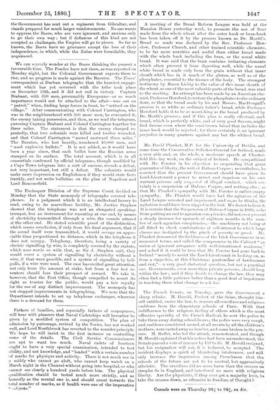Mr. David Minket, M.P. for the University of Dublin, and
some time the Conservative Solicitor-General for Ireland, made a very able and, on the whole, a moderate speech at Chester- field this day week, on the subject of Ireland. He sympathised with Mr. Forster in his objection to suspending that great guarantee of liberty, the writ of Habeas Corpus ; nevertheless, he asserted that the present Government should have given its Lord-Lieutenant a power to arrest and imprison on his own warrant persons only suspected of illegal conduct, —which cer- tainly is a suspension of ITabeas Corpus, and nothing else ; so that Mr. Plunket's sympathy with Mr. Forster is rather empty sympathy. Mr. Pluuket would have had the agitators of the Land League arrested and imprisoned, and so,as he thinks, the agitation would have been nipped in the bud. We do not believe it. It is certain that the Suspension of habeas Corpus in 1866, so far from putting an end to agrarian conspiracies, (lid not even prevent a steady increase for upwards of eighteen mouths in the num- ber of such agrarian conspiracies,—the machinery not being at all fitted to check combinations of self-interest to which large classes are instigated by the pinch of poverty or greed. Mr. Plunket denounced the feebleness of the Irish Government in no measured terms, and called the compromise in the Cabinet " an union of ignorant arrogance with well-intentioned weakness," and asked if it could be true that Mr. Forster had gone back to Ireland "merely to assist the Lord-Lieutenant in looking on, as from a stage-box, at this Christmas pantomime of lawlensnese and riot,"—a very good rhetorical question, but not a practical one. Governments, even more than private persons, should keep within the law ; and if they decide to change the law, they may often find a little patience better than a good deal of impatience in teaching them what change to ask for.


































 Previous page
Previous page